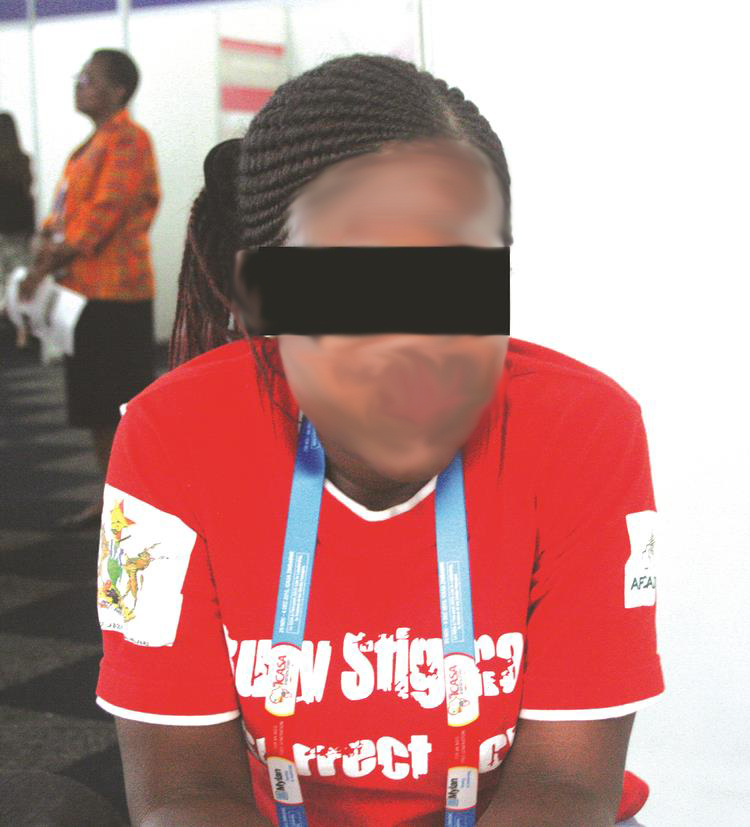
The Sunday Mail

Stories by Shamiso Yikoniko
Despite the strides in the fight against HIV, stigmatisation is still rampant and unfortunately it is not sparing children who are born with the virus.
When one acquires the virus through peri-natal transmission and lives with it through adulthood, they usually have to go through various dilemmas, ranging from status disclosure to stigmatisation.
Worst still, in some communities contracting the virus is still regarded as a death sentence.
For 20-year-old Tanyaradzwa Moyo (not her real name) who shared her life experiences during the recently held International Conference on AIDS and STIs in Africa (ICASA), the journey has been a tough one.
Tanyaradzwa found out that she was living with HIV in 2007 when she was in Grade Seven.
“Having grown up a sickly and frail child, I always thought I was different from other children. The sad thing is that even my mother did not suspect HIV to be the reason behind my health problems.”
“I was attacked by herpes zoster twice, first on my right hand in 2005 and then on my left leg. On both occasions, my mother was advised to have me go for an HIV test but she ignored the advice,” added Tanyaradzwa.
Nevertheless, Tanyaradzwa’s health continued to deteriorate as she was always afflicted by several opportunistic infections.
Tanyaradzwa’s mother then took her for an HIV test at the Highfield Polyclinic and she was found to be HIV-positive.
“After being diagnosed with HIV, my mother did not tell me of my condition.
“My condition was only revealed to me when I was referred to Harare Central Hospital. Then, I didn’t know what having HIV meant, all I cared about was being well and being ‘normal’ like my peers,” Tanyaradzwa said.
She was first given cotrimoxazole for about a week while receiving counselling sessions so that she could understand her condition. Thereafter, she was put on first line treatment.
And she was well again!
But at secondary school, Tanyaradzwa faced discrimination from her peers and teachers.
“I suffered from a persistent dry cough and everyone at school suspected that I was suffering from HIV and from then on, I started facing stigma. I couldn’t make any friends at school, l couldn’t participate in any school activities and teachers would always shout at me because I was not performing well.”
“I kept asking myself why this happened to me. During that time, I thought I was the only child living with HIV. At one time I stopped taking my medication for about three to four months and I got sick again.”
Tanyaradzwa would go for treatment advice and counselling without her mother and there, she would lie that she was taking her antiretroviral medication. However, her CD4 count was telling a different story as it had dropped dramatically, which in itself is a sign of non-adherence.
“I became suicidal and all I wanted was to die. That is the reason l stopped taking medication. I was asked to bring my parents but lied that I was staying alone. I was then advised to join a support group. At first I was hesitant since I was thinking that I was the only young woman living with HIV,” she said.
It took several counselling sessions for Tanyaradzwa to agree to join a support group. She however, was pleasantly surprised to discover that people of various ages where living with HIV.
“Attending the support group restored my hope. I regained my confidence and felt that life had to go on,” Tanyaradzwa said.
“In 2009, I was put on second line treatment since first line treatment had failed. Although I had received a new lease of life, I was being monitored for adherence by a Community Adolescence Treatment Supporter.”
The Community Adolescence Treatment Supporters (CATS) programme, which is administered by an organisation called Africaid Zvandiri, was established in 2009 with the aim of providing community-based treatment, adherence, monitoring and counselling for youths living with HIV.
Tanyaradzwa’s mother also got tested and was found to be HIV-positive.
“It was explained to my mother that the only way I could have contracted HIV was through mother-to-child transmission,” said Tanyaradzwa.
As Tanyaradzwa grew into a woman, another challenge presented itself.
“I became interested in starting a relationship but the dilemma was how I was going to reveal my status to my partner. I have been dating this guy for three years now and I only managed to disclose my status after one-and-a half years of dating,” she explained.
“One day when I was coming from collecting my medication, my boyfriend insisted on carrying my bag. I was afraid he would open the bag and see the ARVs,” Tanyaradzwa added.
“After a week, I shared with him my life experiences and disclosed to him that I was HIV-positive. He accepted me as I am and we have bigger plans for the future together. We, however, agreed to abstain from sex until we are married.”
After realising that being HIV-positive is just a condition and not a death sentence, Tanyaradzwa dreams of becoming an HIV/Aids counsellor.
Currently, she is a volunteer with the CATS programme. In Zimbabwe, about 170 000 children below the age of 15 are living with HIV.
Early disclosure encouraged
PARENTS and guardians have been urged to disclose their children’s HIV statuses from as early as five years so as to avert adolescents’ HIV mortality rate.
Thousands of young children and adolescents living with HIV have died in recent years as their parents failed to initiate them on treatment.
Lack of access to healthcare services due to either late or non-disclosure by parents has been identified as a leading cause of child mortality.
Such children would have acquired the virus through peri-natal transmission.
According to the data released by Unicef last month, the number of adolescents who died from HIV-related infections has tripled in the past 15 years.
Among HIV-affected populations, adolescents are the only group whose mortality figures are not decreasing.
Experts attending the 18th edition of the International Conference on AIDS and STIs in Africa (ICASA) made a plea to guardians taking care of children living with HIV to disclose their HIV statuses early.
Dr Johnface Mdala from IntraHealth International, Namibia, said disclosure is as important as adherence.
“Earlier disclosure helps young people to learn about their condition, to develop skills to cope with their condition and to be involved meaningfully in their care and decisions about their health,” said Dr Mdala.
“In Namibia, we have developed tools aimed at tackling the matter which includes partial disclosure by the age of five years and make it a gradual process up until full disclosure by the time they reach 10 years.”
Full disclosure involves giving a child all the information about their HIV status. The information is more detailed in terms of what HIV is and how it affects the body.
“It’s encouraged for parents to use illustrations, drawings or cartoons to explain in simple ways what HIV is, how it affects the body and how ARVs work,” added Dr Mdala.
Aids is the number one cause of death among adolescents in Africa and the second leading cause of death among adolescents globally.
Africaid-Zvandiri director Ms Nicola Willis said although disclosure is a difficult process, more people are realising that the earlier, the better.
“We have come a long way in terms of people’s understanding about when is the right time to inform a child that he or she is HIV positive. A few years ago, it was commonly thought that disclosure should be done in late adolescence,” she said.
“We generally advocate that there is no set age at which disclosure should take place as every child has individual needs, experiences and circumstances. Most importantly, they should know their HIV status, particularly if they are on ARVs as this helps to adhere better.
“However, this must be done carefully in the best interests of the child and led by the child’s family. Health care facilities across the country are being trained to support and counsel families in the disclosure process.”
Support groups have also been cited as helpful as this is a place where adolescents can come together to learn more about growing up with HIV, including adherence to ARVs.
The adolescents will also share their experiences. A Unicef official based in Tanzania, Ms Alison Jenkins weighed in to support that disclosure is the key.
“It’s important to start the disclosure process early so that the child doesn’t hear their HIV status from other sources rather than the parents or caregivers,” she said.
Disclosure is the process of informing a person about his or her HIV status.
According to the Ministry of Health and Child Care estimates, 6 176 children out of 156 718 living with Aids in the zero-14 years age group died in 2014.
In 2013, 8 741 died of HIV-related diseases.



